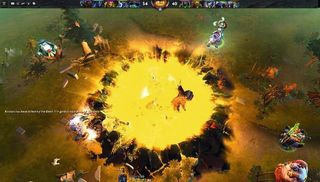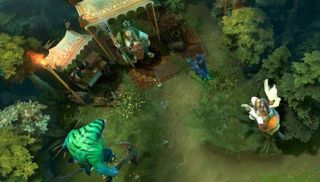Hero's Journey: we visit Valve to get an inside look at the development of Dota 2

“It's tricky,” Johnson tells me. “There is a balance... Dota's a competitive game, and people are deeply invested in it, so losing is not fun, but the people who are winning are probably having a lot of fun. We don't want to dampen both sides of that equation. One of the things we never want to lose is the amazing comeback, like the game we just played – both sides probably would have surrendered in that game at certain points. That would have been a robbery of fun.”
If there's a weakness to Valve's methodology, it's not that they have faith in the wisdom of crowds, but that any crowd is comprised of individuals – and individuals are perfectly capable of behaving and reacting unreasonably. The argument against data-led design says that the customer is always right, and that if an individual customer has a bad time then it doesn't matter what the graph says. It's telling, then, that Valve don't see Dota 2's players as customers – at least, not in the sense that they are Valve's customers.
"We look at every single person in the game as creating user generated content."
“We look at every single person in the game as creating user generated content,” Johnson says. “A person who just plays the game is generating some value for the other nine people playing. It's not something they can sell, but it's content they're creating.”
Dota 2 is built around these transactions, beginning at the individual player level, passing through the Workshop – where usercreated cosmetic items begin their journey to the in-game store, earning six-figure sums for some – all the way to the competitive scene, dispersed among dozens of tournament showrunners who sell tickets and merchandise through the game client. These surrounding systems are a vital part of Dota 2's identity – they're game mechanics too, in a sense. Johnson describes Valve's responsibility to a player who is having a bad time in the same way he talks about Valve's responsibility to its business partners. Valve are just as likely to invest in finding a new way to reward good behaviour as they are to add a new hero.
“Professional players are the next step,” Johnson says, addressing a flaw in Dota 2's current structure. “The amount of value they're creating is extraordinary. I don't think we're close to accurately compensating those players for the value they're creating. That's something we want to turn our focus to.”

Johnson uses business terms to describe Dota 2 – it's a product, a network of creators and consumers exchanging value. There's a calculating intelligence to its design – but that is appropriate, in a sense, because Dota is very much a numbers game. Watch a professional match and observe how economic momentum is as much a measure of a player's performance as kills and deaths. Commentators are just as likely to get excited about a character pulling ahead on a graph as they are a particularly skilful play. Valve's attitude to Dota 2 has a similar ring to it. I get the impression that the development of the game is part business, part fantasy football.
“I'm not trying to be self-deprecating, but there was no grand strategy,” Johnson says. “There's a bunch of people here who were huge fans of DotA 1. We wanted to make that game, and thought we could do a good job of it.”
The biggest gaming news, reviews and hardware deals
Keep up to date with the most important stories and the best deals, as picked by the PC Gamer team.
If any company is in a position to justify a passion project, it's the one sitting on top of Steam. As it happens, Dota 2's snowballing popularity makes it less likely to drain Valve's swimming pool full of money and more likely to bankroll the construction of a water slide.
The word that I keep coming back to is 'trust'. The community, by and large, trusts Valve; and Valve trust the input they receive from their community. They also trust in the quality of the game itself, in IceFrog, and in the notion that there's a huge potential audience for a game this absurdly complicated. They have a 'build it and they will come' attitude to the International that, again, seems predicated on trust. This apparent innocence might well be deceptive, but there's no better expression of it than a room full of smart people cheering because a zombie on a horse carrying three magic swords has just blown up a giant glowing bonsai tree.
“We look at Dota as a product whose lifespan is further out than we can think about usefully,” Johnson tells me when I pry for details of longterm plans. “We just assume that it's going to be around forever.”
Joining in 2011, Chris made his start with PC Gamer turning beautiful trees into magazines, first as a writer and later as deputy editor. Once PCG's reluctant MMO champion , his discovery of Dota 2 in 2012 led him to much darker, stranger places. In 2015, Chris became the editor of PC Gamer Pro, overseeing our online coverage of competitive gaming and esports. He left in 2017, and can be now found making games and recording the Crate & Crowbar podcast.

Valve is adding an 'extra competitive' option to Deadlock that'll make matches harder, but only because everyone in this mode refuses to speak

As Viktor mains rage over their fave being hit with the Arcane twink ray, Riot quietly tinkers with controversial skin reworks on the League of Legends test server
Most Popular




